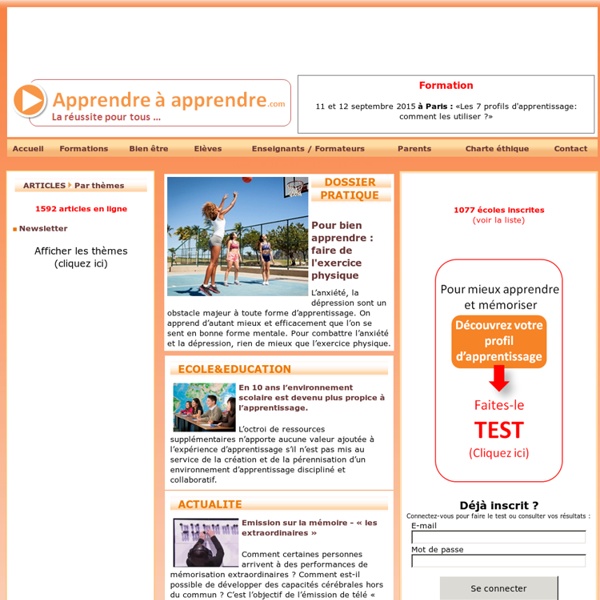



http://www.apprendreaapprendre.com/reussite_scolaire/index.php
Related: Apprendre à apprendre • méthodo5 Ways Schools Can Make Learning Relevant for Students By Tanya Roscorla on November 10, 2014 Eric Sheninger talks about how to make learning work for students at TedxBurnsvilleED. Screenshot of the talk by Tanya Roscorla All too often, school is about what works for adults -- not about what works for students. Hacking Knowledge: 77 Ways to Learn Faster, Deeper, and Better If someone granted you one wish, what do you imagine you would want out of life that you haven’t gotten yet? For many people, it would be self-improvement and knowledge. Newcounter knowledge is the backbone of society’s progress. Great thinkers such as Leonardo da Vinci, Thomas Edison, Benjamin Franklin, Albert Einstein, and others’ quests for knowledge have led society to many of the marvels we enjoy today. Your quest for knowledge doesn’t have to be as Earth-changing as Einstein’s, but it can be an important part of your life, leading to a new job, better pay, a new hobby, or simply knowledge for knowledge’s sake — whatever is important to you as an end goal.
Authentic Assessment and Rubrics Here you will find a hand selected index of authentic assessment resources. Includes information about performance assessment, rubrics, negotiable contracting, electronic portfolios, and web-based tools for creating your own assessments. Examples of RubricsIncludes rubrics for cooperative learning, research reports, eportfolios, PowerPoint/oral presentations, multimedia, video, and web projects The Case for Authentic AssessmentGrant Wiggins describes the need for authentic assessment. The Difference Between Technology Use And Technology Integration Bring TeachThought Professional Development To Your School! The Difference Between Technology Use And Technology Integration by TeachThought Staff
Self-University Week / AUTODIDACTIC PRESS - lifelong learning advocate Self-University Week September 1-7 Autodidactic Press has sponsored Self-University Week since 1989. It is our intention to continually expand this celebration until the value of lifelong learning is indelibly etched into the national consciousness. Chase's Annual Events lists the first seven days of September as Self-University Week. The purpose of Self-University Week is to remind adults (in or out of school) that each of us has a responsibility to help shape the future by pursuing lifelong education. Constant public debate about abortion, gay rights, gun control, and the death penalty remind us that truth is not nearly so easy to obtain as the "right answers" we sought in school.
Educators Evaluate 'Flipped Classrooms' UserID: iCustID: IsLogged: false The Big Picture Of Education Technology: The Padagogy Wheel The Big Picture Of Education Technology: The Padagogy Wheel by TeachThought Staff Teaching is a matter of design. That’s not new, but in an era of change and possibility, it’s more apparent now than ever. The SAMR model (which acts as a kind of continuum to reflect the possibilities of technology in learning) is a helpful tool to make sense of this idea, a visual reminder that ideally technology moves beyond Substitution phase (the “S”) towards a Redefinition (the “R”) of what was previously impossible without it.
How to Learn on Your Own: Creating an Independent Scholar Resource Plan One of the most challenging and gratifying parts of learning alone is the opportunity to search for and select your own learning material. Students in traditional classrooms usually don’t get to decide how they are going to master course content. Instructors decide for them in the form of textbook selection, quizzes, tests, group projects, etc. As an independent learner, you can make your study time more effective by using only the learning methods that work for you.
EducTice : Education, technologies de l'information et de la communication by admin — last modified 2017-11-22 10:08 The very fast evolution of working and learning environments deeply questions school and society. The development of shared digital fluency is presented as a political, social and educational objective. This results in keen institutional demands for a development of the use of ICT (Information and Communication Technologies) by the pupils, the teachers and by all the actors of education. The need for understanding the complexity of ICT integration for educational purposes gave rise, at the national and international levels, to a very significant development of research interested in the design of computer-based environments and in the inquiry into the usage and the learning. EducTice team of IFE (French Institute for Education) contributes to advancing this research.